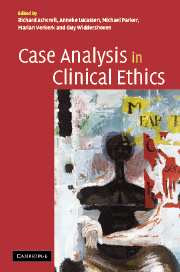Book contents
- Frontmatter
- Contents
- Notes on contributors
- Acknowledgements
- 1 Philosophical introduction: case analysis in clinical ethics
- 2 Families and genetic testing: the case of Jane and Phyllis
- 3 Family access to shared genetic information: an analysis of the narrative
- 4 A virtue-ethics approach
- 5 Interpretation and dialogue in hermeneutic ethics
- 6 ‘Power, corruption and lies’: ethics and power
- 7 Reading the genes
- 8 A utilitarian approach
- 9 A feminist care-ethics approach to genetics
- 10 A conversational approach to the ethics of genetic testing
- 11 Families and genetic testing: the case of Jane and Phyllis from a four-principles perspective
- 12 A phenomenological approach to bioethics
- 13 An empirical approach
- 14 Response to ethical dissections of the case
- 15 Philosophical reflections
- Index
- References
8 - A utilitarian approach
Published online by Cambridge University Press: 01 September 2009
- Frontmatter
- Contents
- Notes on contributors
- Acknowledgements
- 1 Philosophical introduction: case analysis in clinical ethics
- 2 Families and genetic testing: the case of Jane and Phyllis
- 3 Family access to shared genetic information: an analysis of the narrative
- 4 A virtue-ethics approach
- 5 Interpretation and dialogue in hermeneutic ethics
- 6 ‘Power, corruption and lies’: ethics and power
- 7 Reading the genes
- 8 A utilitarian approach
- 9 A feminist care-ethics approach to genetics
- 10 A conversational approach to the ethics of genetic testing
- 11 Families and genetic testing: the case of Jane and Phyllis from a four-principles perspective
- 12 A phenomenological approach to bioethics
- 13 An empirical approach
- 14 Response to ethical dissections of the case
- 15 Philosophical reflections
- Index
- References
Summary
What is utilitarianism?
Utilitarianism is, on one level, a straightforward moral theory (Savulescu 2003). According to utilitarians, all that matters is well-being. The more well-being, the better. The right action is that action that results in the greatest sum total of well-being.
Utilitarianism has several strengths. It does not invoke mysterious or vague concepts like rights, duties (e.g. to some deity), enlightenment (e.g. of the Truth), liberation (e.g. of the worker), which are difficult to define plausibly or apply consistently and appropriately in practice. It invokes the most basic of concepts: that our lives can become better or worse. Our lives become worse, for example, when we die prematurely of some illness. And people's actions are wrong when they make our lives become worse.
Utilitarianism protects the welfare of the individual. People should not be harmed in the name of some ideal or human construct. One needs a very good reason to harm people, according to utilitarianism. Those reasons would have to do with great benefits to other people.
Application
Lucassen writes that in clinical genetics ‘there can be a direct conflict between preserving the confidentiality of one patient and the right of other family members to know information about their genetic status and risk of disease.’
It is notoriously difficult to define a right and balance different rights and interests. What is the ‘right of a family member to know information about their genetic status’? Where do such rights come from?
- Type
- Chapter
- Information
- Case Analysis in Clinical Ethics , pp. 115 - 132Publisher: Cambridge University PressPrint publication year: 2005
References
- 3
- Cited by



